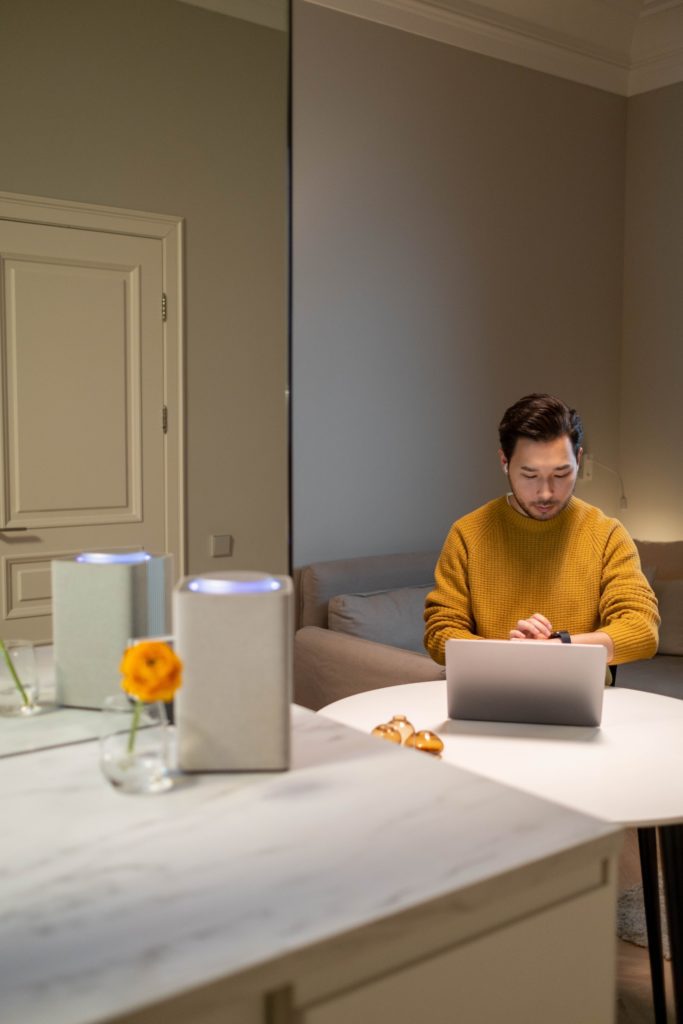Tech Tip: Are Your Smart Speakers Always Listening?
By • November 22, 2021 0 1279

Many people use smart speakers throughout their day-to-day lives, whether it’s as a personal assistant or to control their home entertainment system. However, one of the topics up for discussion is how secure these devices actually are and whether or not we should be concerned about them. Just how secure are your smart speakers and what can you do about their security?
Are They Listening?
It doesn’t matter what you use your smart speaker for; we guarantee that you have thought about whether or not the device is spying on you throughout the day. Sometimes an online ad seems suspiciously timely, or they might try to address an issue that you’ve thought about in recent weeks but haven’t really actively sought out. In cases like this, it’s clear that speakers are listening to you in some capacity, but not nearly as bad as it might initially seem.
Smart speakers are always listening, but they are not always recording. This is the key distinction. Your smart speaker is listening for its “wake-up words” so it can do what it was designed to do. Imagine how many class-action lawsuits these devices would have on their plates if they actually did record anything and everything. A better comparison is looking at a smart speaker as someone who is present but is not actively paying attention to you. They won’t pay you any mind until you call their name or try to get their attention.
You may have noticed that these devices can accidentally be triggered simply due to the fact that they are always listening. When you accidentally trigger the smart speaker, it will start recording. This is why your speaker might answer a question out of the blue. You should review your privacy settings in the device’s corresponding app so that you know when and how it listens to you. These devices often don’t have a physical interface, so users will simply turn it on and use it the way it is right out of the box. It’s safe to say that manufacturers will want to collect more information than you want them to have, so be sure to adjust your default settings.
How to Limit Your Risks
Thankfully, there are several ways you can protect your privacy while using smart speakers and other Internet of Things (IoT) devices. Here are a few:
- Watch your mouth:If you are worried about smart speakers tracking what you say, then it stands to reason that you would watch what you say around them. Don’t give up more data than you need to by keeping a loose tongue.
- Regularly delete command history:Smart speakers use past commands to understand your voice, but the records kept by these devices can become a security risk. Avoid this by regularly deleting records stored by the devices. You can do this individually or in full.
- Opt out of data sharing:Companies that produce smart speakers give users the option to “opt out” of data sharing. While the process is designed to help them improve their voice services (or so they say), you don’t want to share any more than you need to.
- Keep Internet of Things (IoT) devices on their own network:One of the better ways to keep your network secure from these threats is to partition a part of your wireless network specifically for IoT devices. Since most routers allow you to set up multiple networks, this is a viable strategy and one that should be considered.
- Update your software:Finally, a great way to ensure your technology is not susceptible to threats is to keep software up-to-date with the latest patches and updates.
You might get a lot of value out of your smart speaker, but you can’t overlook it as a potential weak point in your network security.
To learn more about how your business can eliminate these weak spots, go to: https://www.cwit.com/blog, or reach out to us at (703) 821-8200.
Alan Edwards, CISM, is chief information officer at Computerware, Inc., in Vienna, Virginia.

